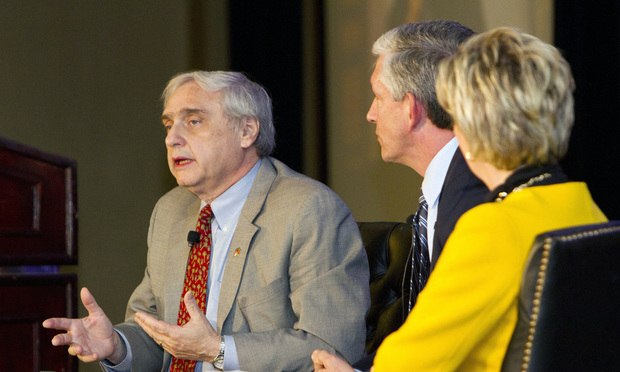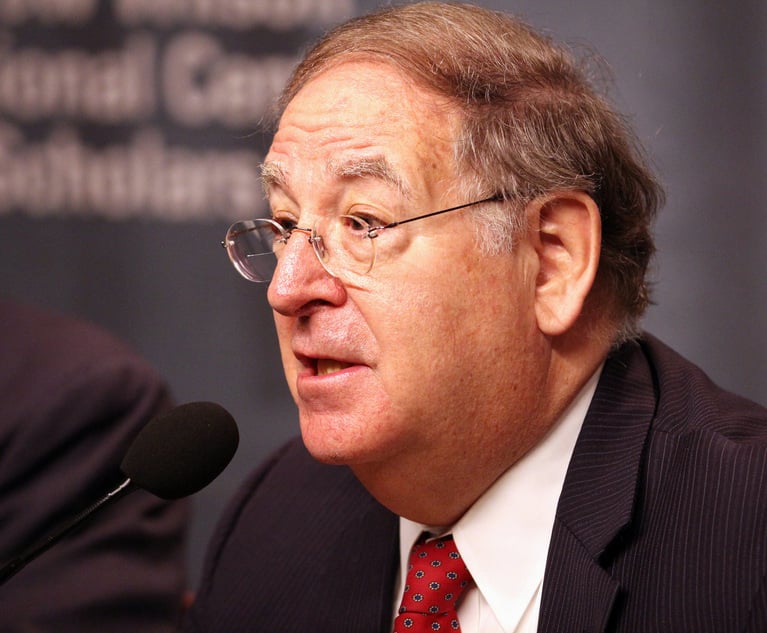Nearly 700 Law Clerks Tell Judiciary to Reform Sexual Harassment Procedures
Hundreds of former and current law clerks have urged judicial officers, including Chief Justice John Roberts, to make meaningful reforms to how the judiciary handles sexual harassment and misconduct complaints.
December 21, 2017 at 06:20 PM
6 minute read

Nearly 700 law clerks, organized over the past few days by four women who had never met, are calling on top judicial officials to change how they handle sexual harassment in the workplace.
The group, which includes 480 former clerks, 83 current clerks and 120 law professors, sent a letter Wednesday urging significant reforms, such as instituting a nationwide reporting system and creating a working group to study the issue. The letter's organizers, all former clerks, said that while the judiciary has been receptive to their suggestions, even implementing some of them this week, what's really needed is a cultural shift in how the legal community views the relationship between a judge and law clerk.
“This is a make-or-break job, especially for people choosing to go for the best-of-the-best legal jobs,” explained Claire Madill, a public defender in Florida and one of the letter organizers. “It creates this culture where the law clerk feels like they can't do anything to ruffle feathers. Even with the processes and procedures in place [for reporting complaints], we still think the power dynamics are a problem, so we just need to change the culture.”
Madill joined three other former clerks, who each work in private practice, in organizing the effort. They include Kendall Turner, a law clerk at Jenner & Block, Sara McDermott, an associate at Munger, Tolles & Olson, and Jaime Santos, an associate at Goodwin Procter. The women had never met, but joined forces to spread the letter to others after current law clerks reached out to them individually for help.
In the wake of the retirement of Ninth Circuit Judge Alex Kozinski, the current clerks, who remained anonymous, wanted to write a letter outlining potential changes in how harassment and misconduct complaints are handled, but felt it would be best if former clerks were the public face of the project.
Kozinski stepped down Tuesday amid claims by former clerks and other women that he harassed them, engaged in unwanted sexual behavior and made other inappropriate comments. Facing a judicial misconduct complaint, he resigned and apologized. His retirement effectively mooted the judiciary's investigation.
McDermott, Turner, Santos and Madill all said they had fantastic experiences as clerks, and none faced any harassment. But each said she was motivated by her own clerking experience, and wanted the best for future clerks too.
“I thought that I kind of owed it to the next generation of law clerks, to make sure they have the opportunity to serve their judges free of harassment,” Santos said.
The letter was addressed to Chief Justice John Roberts, as well as the directors of the Administrative Office of the Courts, the Federal Judiciary and Judge Anthony Scirica, chairman of the Committee of Judicial Conduct and Disability.
The judiciary has already begun to respond to the letter, which has been publicly circulating and garnering signatures for days. The group of clerks said they've been in contact with Ninth Circuit Chief Judge Sidney Thomas, who has been open to their suggestions.
Roberts has also sought to make changes. On his instruction, James Duff, the director of the Administrative Office of the U.S. Courts, issued a memo Wednesday announcing a new working group to study the scope of safeguards against harassment and other inappropriate behavior, a recommendation outlined in the letter.
While it's unclear who will be in the working group, those behind the letter said it's of the utmost importance that it include current or former law clerks.
“I don't think you can address these issues without involving the people who have the most recent experience with the power dynamics that are at play,” McDermott said.
Another change is Monday's revision of the Federal Judicial Center's handbook for federal law clerks. The FJC updated the handbook to clarify that making sexual harassment or misconduct complaints does not violate the judiciary's code of confidentiality, and that complaints are encouraged.
The letter said that while this week's changes are a first step, further reforms are necessary. Under the current system, misconduct complaints against judges are filed with the clerk of the circuit court in which the accused judge serves, and the chief circuit judge considers the complaint.
“This system is flawed for a number of reasons, including that the judge may be the perpetrator of the misconduct or the clerk may be new to the environment and unsure of how to interact with the judge,” the letter said.
The letter said a confidential, national reporting system would streamline the process, and provide “vital guidance” to those in “precarious situations.” Those precarious situations can arise because of the culture of confidentiality and power dynamics that hang over the clerkship system. Clerks, who often have very close relationships with judges, have a duty to keep what happens in chambers to themselves.
Without that confidentiality, there is little trust, McDermott explained. Earning a judge's trust is key to a successful clerkship. But the dynamic between a judge and a clerk can also result in the abuse of that confidentiality.
“The judge has the power in that situation,” she said. “They're your boss. They're your friend. They're your mentor for life. They're a federal judge. They have all the power.”
Like the Law Clerk Handbook, the letter urged that the Administrative Office of the U.S. Courts' Code of Conduct for Judicial Employees also be revised to make clear that confidentiality duties do not preclude employees from reporting misconduct by judges, sexual or otherwise.
Both the code and the handbook, the letter said, should undergo additional revisions to include clear guidelines on how complaints should be handled.
“Sometimes personal misconduct can also become judicial misconduct,” Turner said. “We just want greater clarity on which procedures to follow.”
Other suggestions in the letter included ensuring that sexual harassment is addressed at orientations for law clerks and judicial employees, and that the judiciary take public steps to assure those considering whether to file a complaint that their stories will be taken seriously and that they won't face retaliation.
While the letter's recommendations are specific to the situations that arise between a law clerk and a judge, Santos said she hopes this is the beginning of reform for the legal community at large.
“The judiciary's action on these issues could help serve as a role model for the legal profession,” she said.
This content has been archived. It is available through our partners, LexisNexis® and Bloomberg Law.
To view this content, please continue to their sites.
Not a Lexis Subscriber?
Subscribe Now
Not a Bloomberg Law Subscriber?
Subscribe Now
NOT FOR REPRINT
© 2025 ALM Global, LLC, All Rights Reserved. Request academic re-use from www.copyright.com. All other uses, submit a request to [email protected]. For more information visit Asset & Logo Licensing.
You Might Like
View All
Trump Administration Faces Legal Challenge Over EO Impacting Federal Workers
3 minute read
Private Equity Giant KKR Refiles SDNY Countersuit in DOJ Premerger Filing Row
3 minute read
Quinn Emanuel Files Countersuit Against DOJ in Row Over Premerger Reporting
3 minute read
'Thoughtful Jurist': Maryland US District Senior Judge Messitte Dies After Short Illness
4 minute readTrending Stories
- 1Who Are the Judges Assigned to Challenges to Trump’s Birthright Citizenship Order?
- 2Litigators of the Week: A Directed Verdict Win for Cisco in a West Texas Patent Case
- 3Litigator of the Week Runners-Up and Shout-Outs
- 4Womble Bond Becomes First Firm in UK to Roll Out AI Tool Firmwide
- 5Will a Market Dominated by Small- to Mid-Cap Deals Give Rise to a Dark Horse US Firm in China?
Who Got The Work
J. Brugh Lower of Gibbons has entered an appearance for industrial equipment supplier Devco Corporation in a pending trademark infringement lawsuit. The suit, accusing the defendant of selling knock-off Graco products, was filed Dec. 18 in New Jersey District Court by Rivkin Radler on behalf of Graco Inc. and Graco Minnesota. The case, assigned to U.S. District Judge Zahid N. Quraishi, is 3:24-cv-11294, Graco Inc. et al v. Devco Corporation.
Who Got The Work
Rebecca Maller-Stein and Kent A. Yalowitz of Arnold & Porter Kaye Scholer have entered their appearances for Hanaco Venture Capital and its executives, Lior Prosor and David Frankel, in a pending securities lawsuit. The action, filed on Dec. 24 in New York Southern District Court by Zell, Aron & Co. on behalf of Goldeneye Advisors, accuses the defendants of negligently and fraudulently managing the plaintiff's $1 million investment. The case, assigned to U.S. District Judge Vernon S. Broderick, is 1:24-cv-09918, Goldeneye Advisors, LLC v. Hanaco Venture Capital, Ltd. et al.
Who Got The Work
Attorneys from A&O Shearman has stepped in as defense counsel for Toronto-Dominion Bank and other defendants in a pending securities class action. The suit, filed Dec. 11 in New York Southern District Court by Bleichmar Fonti & Auld, accuses the defendants of concealing the bank's 'pervasive' deficiencies in regards to its compliance with the Bank Secrecy Act and the quality of its anti-money laundering controls. The case, assigned to U.S. District Judge Arun Subramanian, is 1:24-cv-09445, Gonzalez v. The Toronto-Dominion Bank et al.
Who Got The Work
Crown Castle International, a Pennsylvania company providing shared communications infrastructure, has turned to Luke D. Wolf of Gordon Rees Scully Mansukhani to fend off a pending breach-of-contract lawsuit. The court action, filed Nov. 25 in Michigan Eastern District Court by Hooper Hathaway PC on behalf of The Town Residences LLC, accuses Crown Castle of failing to transfer approximately $30,000 in utility payments from T-Mobile in breach of a roof-top lease and assignment agreement. The case, assigned to U.S. District Judge Susan K. Declercq, is 2:24-cv-13131, The Town Residences LLC v. T-Mobile US, Inc. et al.
Who Got The Work
Wilfred P. Coronato and Daniel M. Schwartz of McCarter & English have stepped in as defense counsel to Electrolux Home Products Inc. in a pending product liability lawsuit. The court action, filed Nov. 26 in New York Eastern District Court by Poulos Lopiccolo PC and Nagel Rice LLP on behalf of David Stern, alleges that the defendant's refrigerators’ drawers and shelving repeatedly break and fall apart within months after purchase. The case, assigned to U.S. District Judge Joan M. Azrack, is 2:24-cv-08204, Stern v. Electrolux Home Products, Inc.
Featured Firms
Law Offices of Gary Martin Hays & Associates, P.C.
(470) 294-1674
Law Offices of Mark E. Salomone
(857) 444-6468
Smith & Hassler
(713) 739-1250










